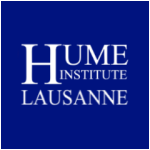Welcome to the Hume Institute Lausanne. The evidence from recent international benchmarking studies such as PISA is incontrovertible that both excellence and equity can be achieved at scale in contemporary educational systems and organisations. There is also no doubt that many of the world’s educational systems have made significant positive changes over recent decades. However, such progress is not being consistently achieved and there is still too much variability in student outcomes within both schools and educational systems. It is also indubitably true that we have generated substantial practical research-based knowledge over the past fifteen years about how to improve both schools and systems. Yet debates still rage at the policy, practitioner and academic levels over which policy levers and strategies actually make the difference.
As part of its commitment to global societal change, the Hume Institute is launching a Doctoral programme in Achieving Excellence and Equity in Education led by Professor Emeritus David Hopkins. The programme positions itself in the middle of that triangle whose vertices are comprised of policy, research and practice. As such the course is designed for senior educational professionals and leaders working in schools, colleges, and other educational institutions committed to high quality teaching, learning and leadership. This is particularly true for those working in education’s vital ‘middle tier’ – Local Authorities, Districts and Municipalities as well as CEOs of Multi-Academy Trusts, Charter Schools and similar.
The purpose of the programme is to enhance the professional effectiveness of participants through induction into the knowledge base on educational reform and leadership. The programme emphasises the development of practical strategies for change and sustained research enquiry into the impact of these models on the performance of students broadly defined. The ethos of the programme emphasises, collaboration, rigour and the development of intrinsic motivation. The programme balances a study of Achieving Excellence and Equity in Education from research, theoretical and practical perspectives in a variety of global contexts. In short, this doctoral programme will develop high standard professional, organisational and political skills and knowledge to meet the vast challenges associated with improving both public and private educational environments, as well, as responding to unforeseen predicaments such as the current Covid Pandemic.
Professor Emeritus David Hopkins is currently Chair of Educational Leadership at the University of Bolton, as well as being Emeritus at the Institute of Education, University College London and the University of Nottingham. David is passionately committed to improving the quality of education for all and has worked at the intersection of policy, research and practice for over forty years. Among a range of educational roles, he has been Chief Adviser to three Secretary of States on School Standards in the UK, Dean of Education at the University of Nottingham, a secondary school teacher and Outward Bound Instructor. David helped found the National College for School Leadership, is a long-term consultant to the OECD, supports a range of global organisations and systems on school reform and is the founder of the Adventure Learning Schools Charity. Despite two new knees, he still practices occasionally as an International Mountain Guide; over the years he has led 12 expeditions to the Greater ranges and was one of the ten British Mountain Guides to first receive the UIAGM carnet in 1978. David has recently completed his school improvement trilogy with the publication of Exploding the Myths of School Reform; the previous books being School Improvement for Real (2001) and Every School a Great School (2007). He was recently ranked as the 16th most influential educator in the world by the American based Global Gurus organization.
All Hume candidates participate in a Research Methodology course. Alongside this they work with their research supervisors in online tutorials. These are further accompanied by peer workshops, annual colloquia and twice-yearly mock vivas.
A unique feature of this programme is that the programme leader, Professor Hopkins will lead a series on online seminars on Achieving Excellence and Equity in Education during the candidates first year of the programme to ensure that all graduates have a thorough induction into the evidence base underpinning the focus of their enquiry. In addition, Guest Lectures / Webinars will be included in this series of seminars given by global leaders in leadership, achieving equity, curriculum and pedagogy, system and school improvement, all of whom are members of Professor Hopkins’ international network.
Through the PhD in Achieving Excellence and Equity in Education, we are seeking to develop research topics within or across the following areas:
• Strategies for system change and improvement in a variety of global settings
• System architecture characteristics for effective school systems
• Leadership of educational change
• Professional development and peer coaching
• Pedagogic strategies and curriculum designs for personalised learning
• Balancing internal and external accountability
• The key constituents of whole school designs
• Key performance indicators of educational systems
• The role of innovation and networking in educational reform
• Achieving both Equity and Excellence in challenging societal contexts.
When the Programme Director signals assent, a Research Supervisor is appointed for the duration of the Doctoral programme.
All applicants to Hume must satisfy one of the following conditions in order to be considered for an interview with a Programme Director or Tutor:
A good Master’s degree from a recognised university, OR
Ten or more years’ experience in a related area of work, plus an undergraduate degree of high standing.
In addition, in all cases where a student has not previously completed a degree (undergraduate or postgraduate) taught in English, it will be necessary to provide one of the following:
IELTS – Overall score 6.5. No less than 6.0 in any section.
TOEFL – Overall score 90 with minimum scores of 21 for writing, 21 for listening, 22 for reading and 23 for speaking.
Pearson – 58 with no less than 55 in all communicative skills
Further, Programme Directors will expect candidates to provide an advanced research proposal of approximately two thousand words. This will identify questions of interest, rationale, key citations and anticipated impact. It will be discussed as part of an interview process and is likely to be altered before or after acceptance, as is normal research procedure.
Duration for the full-time programme is normally 3 – 4 years with a fee of £12,000 per year;
Duration for the part-time programme is normally 5 – 6 years for a fee of £6,000 per year.

